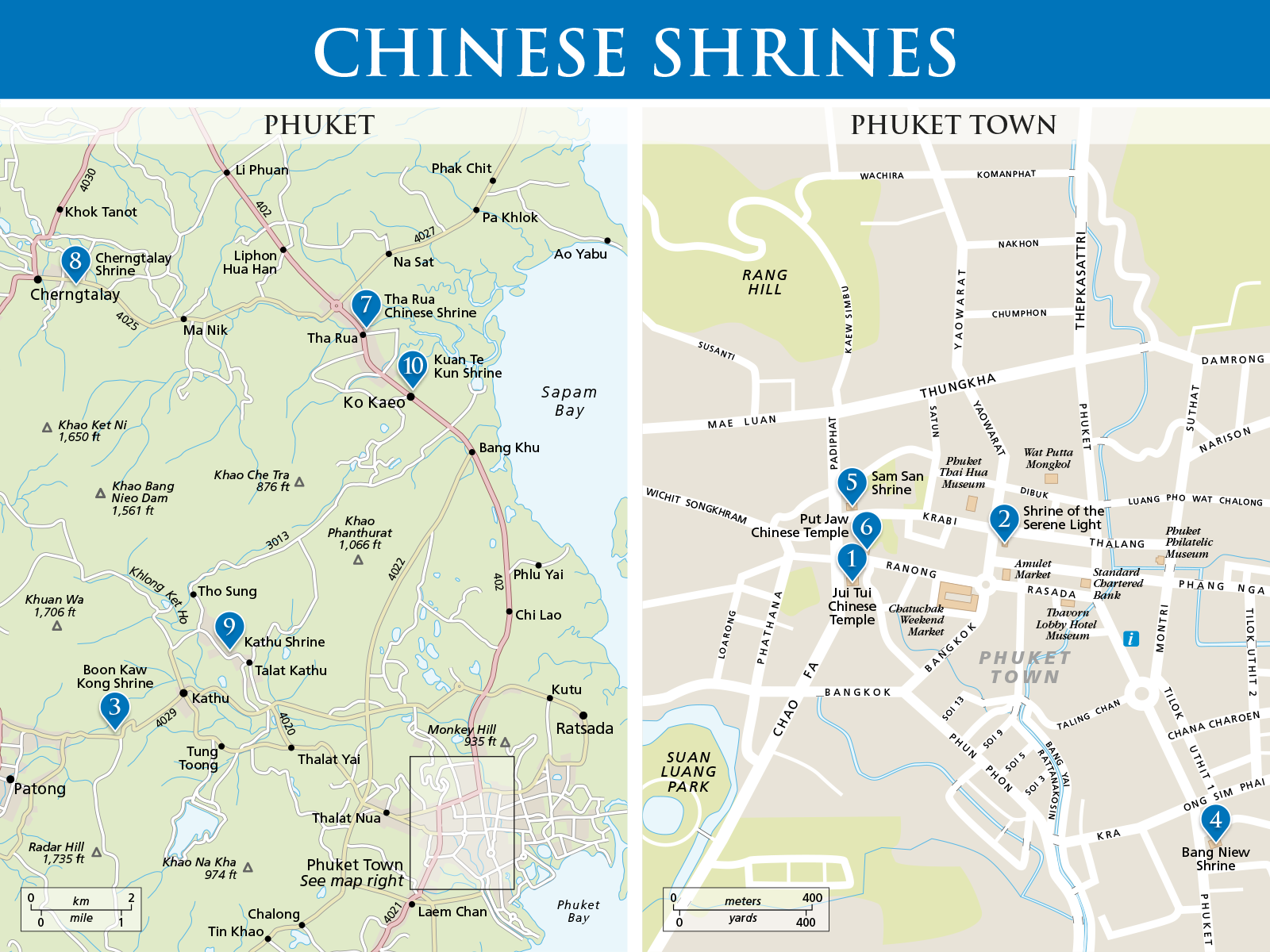
Chinese Shrines
1. Jui Tui Chinese Temple
This colorful Taoist temple, dedicated to the vegetarian deity Kiu Wong In, plays a central role in the annual Phuket Vegetarian Festival. Originally built in 1911 on Soi Romanee, the first Jui Tui temple was destroyed by a fire and rebuilt at its current location.![]() Soi Phuthorn, Ranong Road, Phuket Town • Open 8am–5:30pm daily
Soi Phuthorn, Ranong Road, Phuket Town • Open 8am–5:30pm daily
2. Shrine of the Serene Light
Built by a local Chinese family more than 100 years ago, this historic shrine, once hidden down a narrow alleyway, can be viewed directly from Thalang Road today. Brightly colored ornamentation adorns the roof of the shrine’s red-pillared entranceway.![]() Chao Fah Nok Road • 07621 1036, 07621 2213 • Open daily
Chao Fah Nok Road • 07621 1036, 07621 2213 • Open daily
3. Boon Kaw Kong Shrine
Drivers often honk their car horns for good luck as they pass by this revered shrine located on the hilltop between Patong and Kathu. Besides simply hoping for good fortune, the drivers are also acknowledging the ghosts of travelers who have died while passing over the hill in the past. Well integrated in the local community, this small but popular shrine frequently shows fims on a giant outdoor screen.![]() Patong Road • Open 9am–5pm daily
Patong Road • Open 9am–5pm daily
4. Bang Niew Shrine
Destroyed twice by fire, this century-old shrine – also known as Tao Bong Keng or Chai Tueng – plays an important role in the annual Vegetarian Festival. Here, one may see devotees with bizarre piercings, or walking across red-hot coals. The shrine houses deities believed to assist worshippers with their career aspirations.![]() Ong Sim Phai Road, Phuket Town • Open 7am–5:30pm daily
Ong Sim Phai Road, Phuket Town • Open 7am–5:30pm daily
5. Sam San Shrine
Built in 1853 and dedicated to Mazu, the Chinese goddess of the sea, this shrine frequently hosts ceremonies to consecrate new boats before their maiden sea voyage. The shrine pays homage to the patron saint of sailors, and also features a number of intricate carvings.![]() Krabi Road, Phuket Town • Open 8am–5:30pm daily
Krabi Road, Phuket Town • Open 8am–5:30pm daily
6. Put Jaw Chinese Temple
The island’s oldest Chinese temple is dedicated to the goddess of mercy. Those suffering from health afflictions often come here to pray for relief; the monks here also hand out prescriptions for Chinese herbal medicines. The temple helps parents name their newborn babies.![]() Soi Phuthorn, Ranong Road, Phuket Town • Open 6:30am–8pm daily • Adm
Soi Phuthorn, Ranong Road, Phuket Town • Open 6:30am–8pm daily • Adm
7. Tha Rua Chinese Shrine
The largest Chinese temple in Phuket, Tha Rua has undergone a series of massive renovations, reported to cost upwards of B40 million and funded entirely by private donations. Colorful, with bold dragon motifs and brilliantly lit at night, the new Tha Rua Chinese Shrine is far more elaborate in scale than its predecessor.![]() Thepkasattri Road • Open 6am–6pm daily
Thepkasattri Road • Open 6am–6pm daily
8. Cherngtalay Shrine
Popular with local community members who seek healing from the shrine’s deities, Cherngtalay Shrine dates back more than 100 years to the founding of a settlement of Chinese tin-mine workers. The ornately decorated tile roof depicts eight immortal Chinese gods, along with the colorful dragon imagery common to many of these temples.![]() Thalang District • Open 7am–5:30pm daily
Thalang District • Open 7am–5:30pm daily
9. Kathu Shrine
Credited as the first Chinese shrine on Phuket to celebrate the Vegetarian Festival, this temple features a fascinating collection of Taoist deity statues in a variety of postures. These intricately designed statues are the main objects of worship at the shrine.![]() Kathu Village • Open 8am–5:30pm daily
Kathu Village • Open 8am–5:30pm daily
10. Kuan Te Kun Shrine
Though less prominent than some of the other shrines on Phuket, Kuan Te Kun – commonly known as Sapam Shrine – nonetheless served as the opening location for the island’s massive nine-day Vegetarian Festival in 2010. With brilliantly colored dragons encircling its four main pillars, and others guarding its entrance, Kuan Te Kun is full of photographic opportunities.![]() Sapam Village • Open 8am–5:30pm daily
Sapam Village • Open 8am–5:30pm daily
